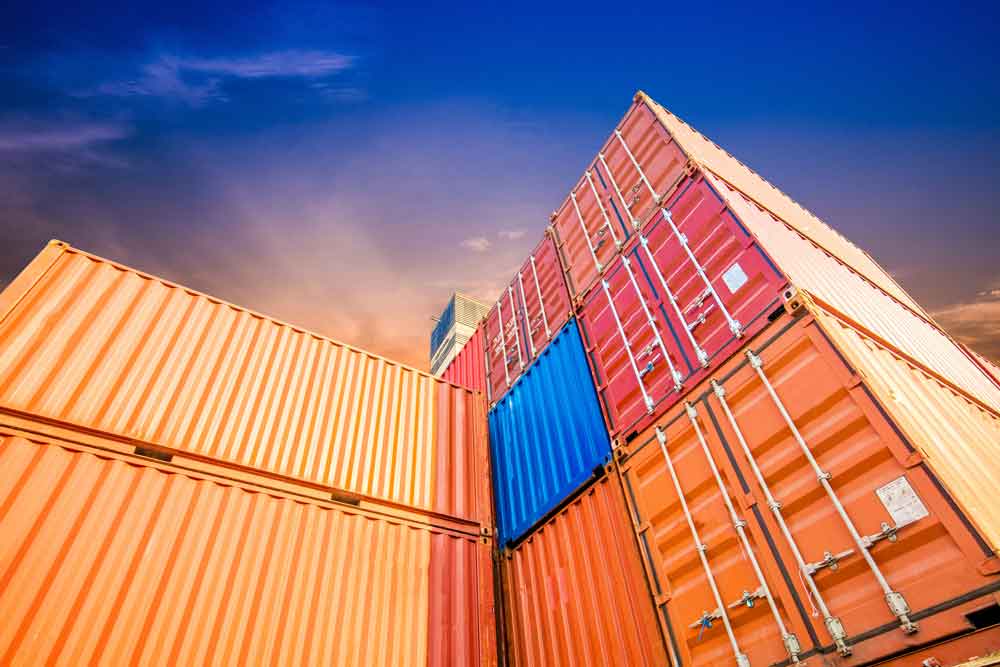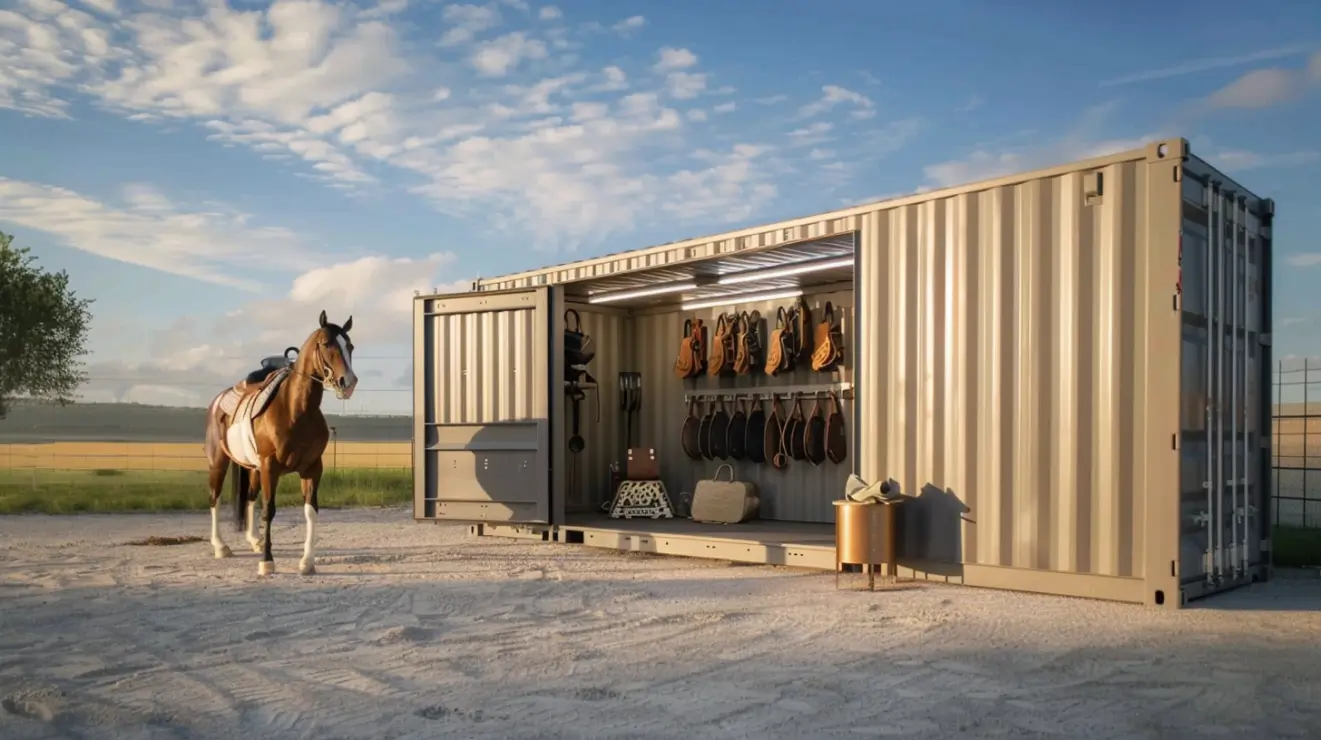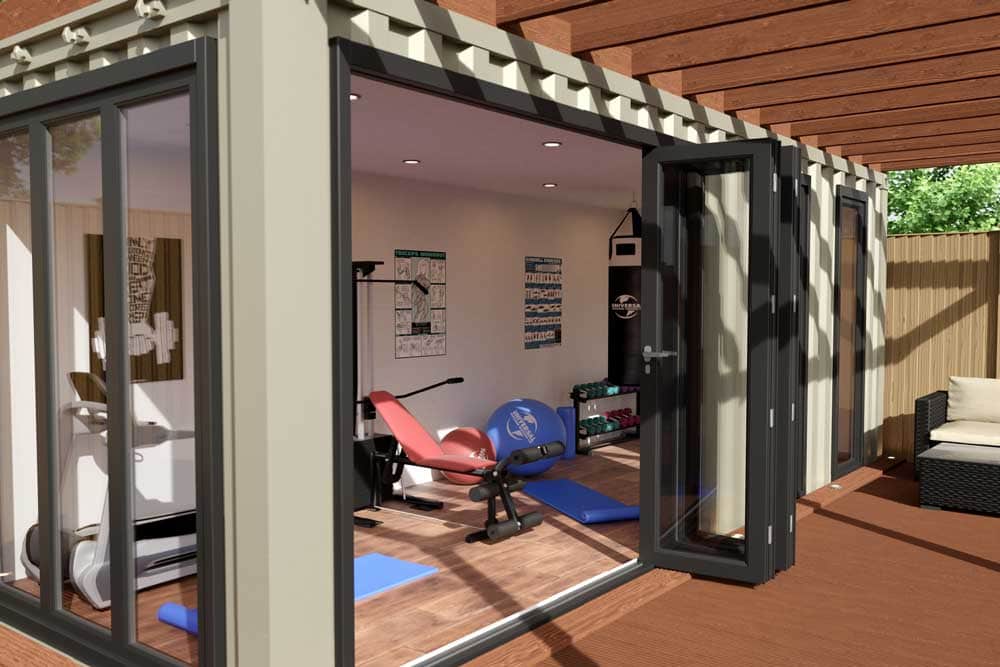Moving home or office? Construction site needing temporary storage? Transporting goods from point A to point B? Need event catering storage space? You might be torn between buying and leasing shipping containers for any of these purposes.
Before you dive headfirst into the world of buying shipping containers, let us give you the lowdown on why hiring a shipping container might just be the way to go.
When to buy vs lease a shipping container
Deciding whether to buy or lease a shipping container can be a tough decision, several factors need to be taken into account to make sure you make the right one for your needs.
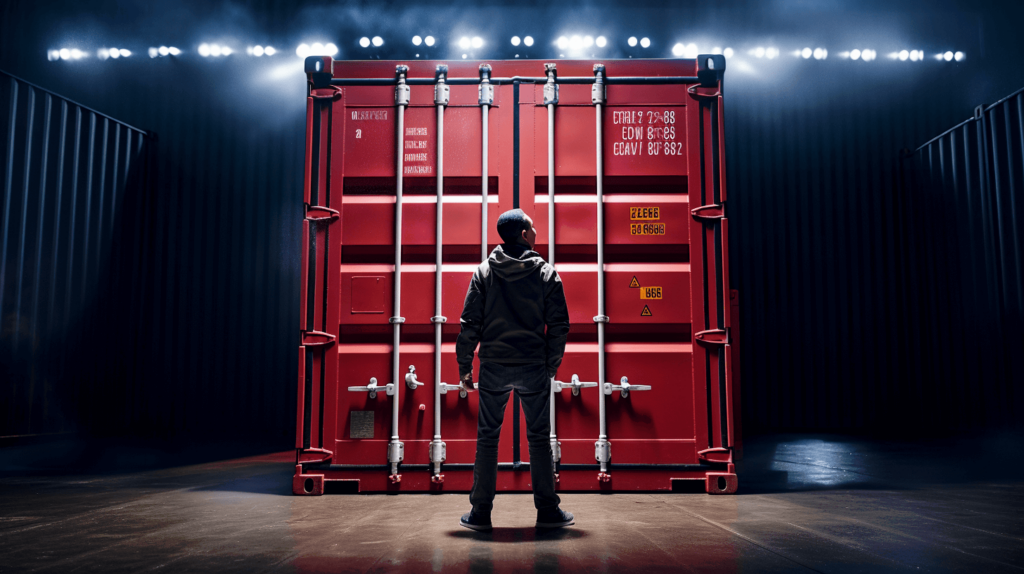
Buying a shipping container can be a good option if you have a long-term need for it. If you’re planning to use it for a few years or more, then buying might make more sense. Plus, when you buy, you have complete ownership and control over the container. You can modify it, paint it, or even sell it later if you no longer need it.
On the other hand, leasing a shipping container can be a better choice if you only need it for a short period of time. Let’s say you’re moving to a new location and need a container for a few months while you renovate your new place. Leasing allows you to have the container for as long as you need it without the commitment of buying.
When to buy a shipping container: Pros and cons
The decision to buy a shipping container isn’t a one-size-fits-all solution. Purchasing a container can offer several advantages, but it also comes with its own set of challenges. Whether you’re an entrepreneur, a homeowner with grand design ideas, or a business seeking storage solutions, it’s essential to weigh the benefits against the drawbacks.
Understanding the pros and cons of buying a shipping container can ensure that your choice aligns with your objectives.
Pros of buying a shipping container
Owning a shipping container comes with some great advantages, ideal for various applications and long-term needs. Here are the key benefits to consider:
- Cost-effective option for long-term storage or transportation needs.
- Availability of various sizes and configurations to suit specific requirements.
- Durable and weather-resistant construction ensures protection of stored items.
- Can be easily modified or customised for different purposes.
- Offers security and peace of mind for storing valuable or sensitive items.
- Potential for repurposing containers into creative living or workspace solutions.
Cons of buying a shipping container
While purchasing a shipping container offers certain perks, there are also challenges and potential downsides to be aware of. Here are the main drawbacks to take into consideration:
- Upfront cost can be high, especially for newer or specialised containers.
- Requires adequate space for delivery and placement.
- May require additional expenses for transportation, permits, and modifications.
- Limited availability in certain locations, leading to potential delays or higher costs.
- Requires regular maintenance to prevent rust or deterioration.
- May not be suitable for short-term or temporary storage needs.
Looking for more information on how much shipping containers actually cost?
Understanding the costs can help you make informed decisions, whether you’re purchasing for shipping, storage, or conversion. Factors such as size and condition can significantly influence the price of shipping containers.
Check out our guide “How Much Are Shipping Containers? Shipping Container Costs Explained” for insights on container sizes and the factors that affect their cost.
View guideWhen to lease a shipping container: Pros and cons
When considering whether to lease a shipping container, it is important to weigh the pros and cons to make an informed decision. Leasing a shipping container can offer several advantages, but it also comes with certain drawbacks.
Pros of leasing a shipping container
Opting to lease a shipping container can present numerous benefits, especially for those looking for flexibility and short-term solutions. Here are the primary advantages of leasing to keep in mind:
- Flexibility: Leasing a shipping container allows you to use it for a specific period of time, without the commitment of purchasing one.
- Cost-effectiveness: Leasing a container is usually more affordable than buying one outright, especially if you only need it for a short-term project.
- No maintenance costs: When you lease a container, the responsibility of maintenance and repairs usually falls on the leasing company, saving you time and money.
- Easy upgrades: If your needs change, you can easily upgrade to a larger or smaller container by simply adjusting your lease agreement.
- Quick availability: Leasing a container allows you to get one quickly, as leasing companies often have a large inventory ready for immediate use.
Cons of leasing a shipping container
While leasing a shipping container may seem appealing for many reasons, it’s essential to recognise its potential limitations and challenges. Here are the main considerations to factor in when evaluating the downsides of leasing:
- No ownership: When you lease a container, you don’t own it, which means you have no equity in the asset.
- Long-term costs: If you need a container for an extended period, leasing may end up being more expensive than buying one.
- Limited customisation: Leased containers may have limitations on customisation options, as they are usually standardised.
- Dependence on leasing company: You rely on the leasing company for maintenance, repairs, and timely delivery, which may not always meet your expectations.
- Potential availability issues: During peak seasons, leasing companies may have limited availability, making it harder to get the container you need when you need it.
What size containers are available to rent?
When it comes to renting shipping containers, there are plenty of size options that cater to a wide range of needs. From compact 10 foot containers perfect for smaller storage requirements to expansive 40 foot containers capable of housing larger items or facilitating big projects, the options are diverse. In between, the commonly rented 20 foot containers strike a balance, often favoured for their versatility in both storage and transport.
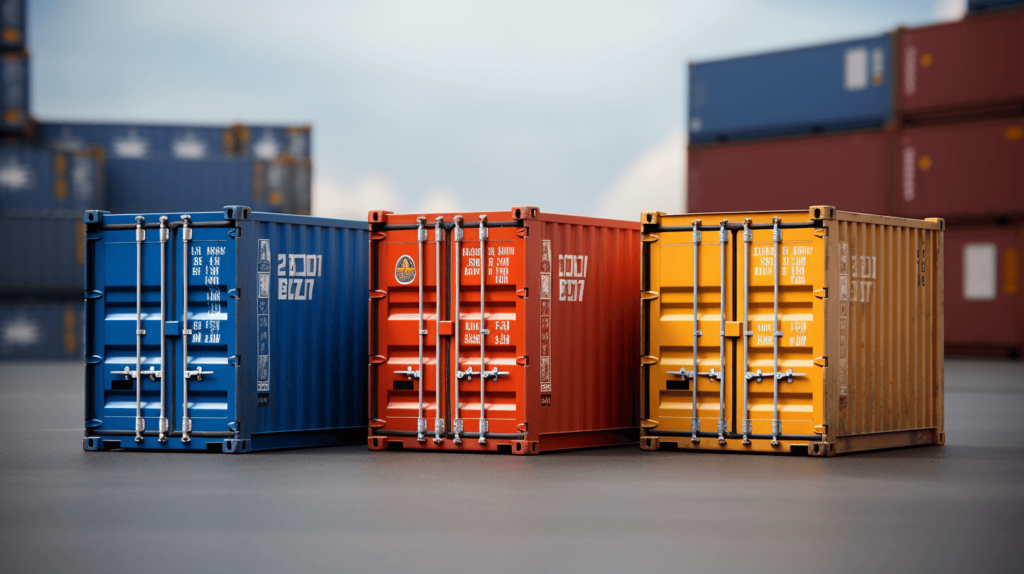
At Universal Containers, along with offering additional 8 foot and 30 foot containers for rent, we also offer specialised sizes such as “high-cube” options that provide additional height, as well as modified containers, such as site container offices and retail containers.
Before settling on a size and type of shipping container, it’s essential to evaluate your specific requirements, ensuring that the container you choose aligns with your project’s demands and the available space on your property.
Curious about the different sizes of shipping containers and how they can fit your needs?
Understanding container sizes is essential for optimising storage, shipping, or conversion projects. Each size serves unique purposes, whether you require a compact solution or a more spacious option.
Read more about the different sizes of shipping containers and their various uses in our “Shipping Container Sizes & How to Use Them” guide!
Read guideHow much does renting a shipping container cost?
The cost of renting a shipping container is not fixed and can vary widely based on a range of factors. To understand the potential expenses and what might affect the rental price, here’s a broad overview of these factors:
Size and type of the shipping container
Naturally, larger containers, such as the 40 foot units, will cost more to rent than smaller 10 foot or 20 foot units. Specialty containers, like refrigerated or high cube units, may also come at a premium due to their specialised features.
Location
Rental prices can fluctuate based on the region you’re looking to rent a container in. Urban areas or regions with a higher demand for containers may have higher rental costs compared to less populated or lower-demand locales.
Duration
Most companies offer both short-term and long-term rental options. A longer-term commitment might reduce the monthly rate, while short-term rentals could have a higher per-day or per-month cost.
Condition
Brand new shipping containers, also referred to as “one-trip” containers, which have been used only once, are usually more expensive to rent than older, previously used and well-travelled units.
Delivery and pickup fees
Depending on the company, there might be additional charges for delivering and picking up the container. This cost can be influenced by the distance from the company’s location to the delivery site.
Additional services
If you’re looking for modifications, such as adding shelving, windows, or insulation, these will come at an added cost.
To get an accurate estimate for your specific needs, it’s best to contact us directly. On average, you might expect to pay anywhere from £75 to £200 per month for a standard 20 foot container, but again, prices can fluctuate based on the aforementioned factors.
How to rent a shipping container?
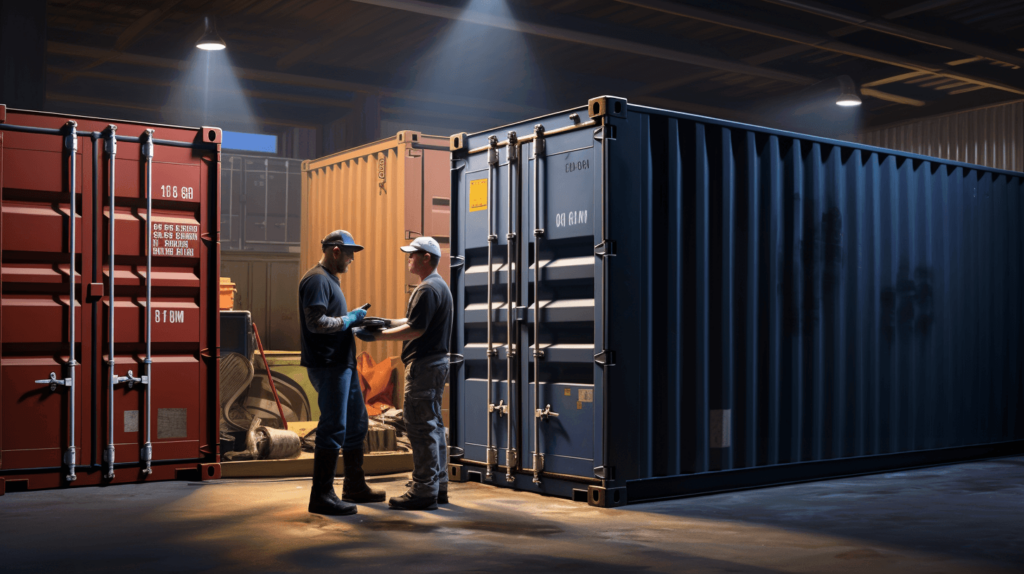
Renting a shipping container is a pretty straightforward process, but it does require some careful planning and consideration.
- Start by identifying your specific needs, such as the size and type of container, the rental duration, and any additional features or modifications you may require.
- Once you’ve pinpointed your requirements, research reputable leasing companies in your area, comparing their rates, terms of service, and customer reviews.
- After selecting a provider, contact them directly to inquire about availability, delivery options, and any associated fees.
- Be sure to inquire about delivery and pickup options, maintenance responsibilities, and any additional costs. It’s also important to discuss the rental duration and understand the terms for extensions or early returns.
- Before finalising the rental, ensure you have a suitable location for the container, considering factors like accessibility, ground levelling, and local regulations.
After these steps, you’ll be ready to finalise the shipping container lease by signing a rental agreement, after which the container will be delivered to your specified location and ready for use.
Choosing the right shipping container leasing company
Navigating the world of shipping container leasing requires more than just pinpointing the right size or price; the leasing company itself plays a vital role in ensuring a smooth and satisfactory experience.
When selecting a company, prioritise those with a strong reputation, underscored by positive customer reviews and testimonials. Investigate their history in the industry, ensuring they have a track record of reliability and professionalism. Transparency in pricing, clear terms of service, and responsive customer support are indicators of a trustworthy provider.
Additionally, consider the range of services they offer — from delivery and pick-up logistics to maintenance support during the lease period. By taking the time to meticulously research potential companies, you can be confident in your choice and enjoy a hassle-free leasing experience.
Why hire a shipping container from Universal Containers?
People don’t hire containers because they want to, they hire containers because they need to. A certain problem or issue has arisen that needs to be resolved by sourcing additional space that is fit for purpose. Leasing a shipping container is usually the solution.
With so many different container options available for hire, we’re certain that we can provide and install a container to suit your needs and tick all your boxes. We guarantee all our shipping containers are:
Secure
If you’re looking for a short-term storage facility that will be safe from interference, shipping containers are the ideal solution. Their overall structure means that they are extremely secure, and even additional security parts and accessories can be added for peace of mind, such as a lock box.
Portable
It is important to consider that a container was initially designed for the purpose of transporting cargo across seas. With this in mind, shipping containers – even converted shipping containers – are easily portable and ideally suited to transit bulkier items, vehicles or machinery.
Durable
Shipping containers were built to withstand the elements on rail, road or sea. This is still true once they are converted or used for other purposes. Built from galvanised steel, containers are highly durable which means that they will store or transport your items safely with no risk of damage.
Fit for purpose
Of course, our containers are available for hire as seen, but if you have a specific purpose in mind for your container – let us know! We have converted shipping containers available for hire that may be better suited to your project. For instance, we have refrigerated containers available for hire which are ideally suited to event catering, additional storage for florists, transit of perishable goods, and so much more.
Accessible
Our specialised containers can be available for hire on request. If you have a specific project which requires a more specialised container, for instance, a double door, full side access or open top container, we will provide you with a container that is fit for purpose, accessible to fit your project specification, and low cost.
Low cost
Rather than having to extend your premises or source long-term self-storage facilities, shipping container hire can be a quick, low cost answer to storing or transporting items. At Universal Containers, we’re in the business of finding the best deals for our customers, so if we feel that we can provide you with a more cost-effective solution, our friendly team will be sure to inform you of your options.
Hassle free
Hiring a container is a very economical solution to your storage or transit problem. You can rest assured that we take all the hard work away from you, as our professional team deliver and install containers at any UK mainland address.
The bottom line
If you’re in need of extra storage space or looking to transport goods, hiring a shipping container is a fantastic option. First of all, it’s incredibly convenient. You don’t have to worry about finding a permanent location for storage or dealing with the hassle of transporting goods yourself. Just rent a shipping container and have it delivered right to your doorstep. Plus, it’s cost-effective.
Buying a shipping container can be quite expensive, especially if you only need it for a short period of time. By hiring one, you save money and only pay for the duration you actually need it. So, whether you’re moving, renovating, or just need some short term extra space, our recommendation is that hiring a shipping container is the way to go!
FAQs
What condition will the hired container be in?
When you hire a shipping container from us, you can expect it to be in good, functional condition. All our rental containers undergo a thorough inspection and cleaning process before they are dispatched for hire. While some of our units may show signs of wear, such as minor dents or surface rust due to their history of use, they will always be watertight, structurally sound, and fit for their intended purpose.
If you have specific requirements or are looking for a container in a near-new condition, please let us know, and we’ll do our best to accommodate your needs. Your satisfaction is our priority, and we strive to ensure that the quality of our containers meets or exceeds your expectations.
What are the different types of shipping container leasing agreements?
When leasing a shipping container, you’ll find that there are generally three main types of agreements available:
Short-term lease: This is ideal for temporary needs, such as a one-time event or short-term storage. The rental period can range from a few days to several months.
Long-term lease: A long-term lease is typically for a year or more, suitable for ongoing storage or business use.
Lease-to-own: This option allows you to rent the container with the intention of purchasing it at the end of the lease term. A portion of your rental payments may be applied to the purchase price.
Each type of leasing agreement has its own terms and conditions, so it’s essential to carefully review the contract and understand your obligations before committing to a lease. Don’t hesitate to reach out to us if you have any questions or need further clarification. We’re here to help!
Better informed? We hope so! It can be difficult to think outside the box if you’re considering a space-saving, transit or storage solution. However, if you think hiring a fit-for-purpose container could be just the job, reach out to our team for a friendly, no obligation chat.
If you would like to know more about how to hire a shipping container, please call the Universal team today on 0845 050 0330 or feel free to email andy@universal-containers.com.


